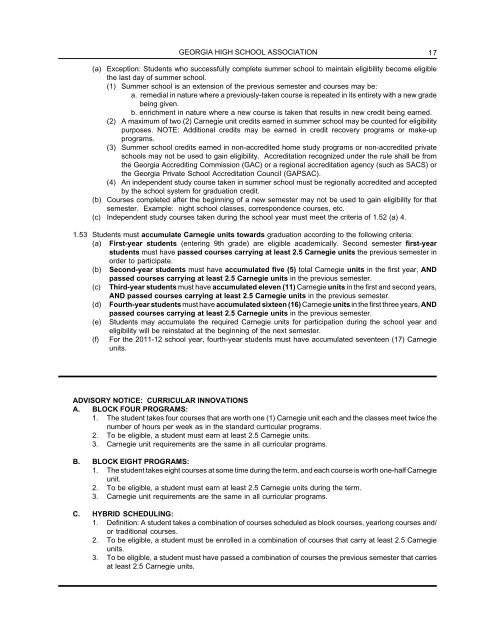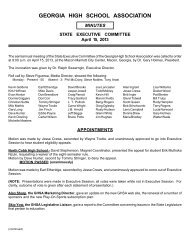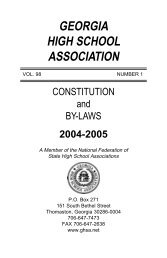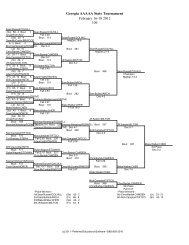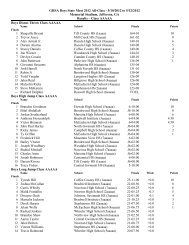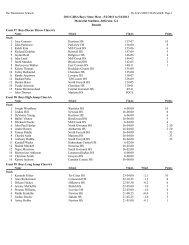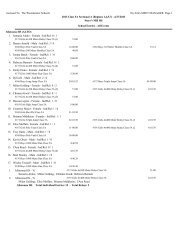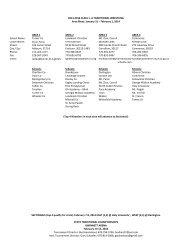2010-2011 - Georgia High School Association
2010-2011 - Georgia High School Association
2010-2011 - Georgia High School Association
You also want an ePaper? Increase the reach of your titles
YUMPU automatically turns print PDFs into web optimized ePapers that Google loves.
GEORGIA HIGH SCHOOL ASSOCIATION 17<br />
(a) Exception: Students who successfully complete summer school to maintain eligibility become eligible<br />
the last day of summer school.<br />
(1) Summer school is an extension of the previous semester and courses may be:<br />
a. remedial in nature where a previously-taken course is repeated in its entirety with a new grade<br />
being given.<br />
b. enrichment in nature where a new course is taken that results in new credit being earned.<br />
(2) A maximum of two (2) Carnegie unit credits earned in summer school may be counted for eligibility<br />
purposes. NOTE: Additional credits may be earned in credit recovery programs or make-up<br />
programs.<br />
(3) Summer school credits earned in non-accredited home study programs or non-accredited private<br />
schools may not be used to gain eligibility. Accreditation recognized under the rule shall be from<br />
the <strong>Georgia</strong> Accrediting Commission (GAC) or a regional accreditation agency (such as SACS) or<br />
the <strong>Georgia</strong> Private <strong>School</strong> Accreditation Council (GAPSAC).<br />
(4) An independent study course taken in summer school must be regionally accredited and accepted<br />
by the school system for graduation credit.<br />
(b) Courses completed after the beginning of a new semester may not be used to gain eligibility for that<br />
semester. Example: night school classes, correspondence courses, etc.<br />
(c) Independent study courses taken during the school year must meet the criteria of 1.52 (a) 4.<br />
1.53 Students must accumulate Carnegie units towards graduation according to the following criteria:<br />
(a) First-year students (entering 9th grade) are eligible academically. Second semester first-year<br />
students must have passed courses carrying at least 2.5 Carnegie units the previous semester in<br />
order to participate.<br />
(b) Second-year students must have accumulated five (5) total Carnegie units in the first year, AND<br />
passed courses carrying at least 2.5 Carnegie units in the previous semester.<br />
(c) Third-year students must have accumulated eleven (11) Carnegie units in the first and second years,<br />
AND passed courses carrying at least 2.5 Carnegie units in the previous semester.<br />
(d) Fourth-year students must have accumulated sixteen (16) Carnegie units in the first three years, AND<br />
passed courses carrying at least 2.5 Carnegie units in the previous semester.<br />
(e) Students may accumulate the required Carnegie units for participation during the school year and<br />
eligibility will be reinstated at the beginning of the next semester.<br />
(f) For the <strong>2011</strong>-12 school year, fourth-year students must have accumulated seventeen (17) Carnegie<br />
units.<br />
ADVISORY NOTICE: CURRICULAR INNOVATIONS<br />
A. BLOCK FOUR PROGRAMS:<br />
1. The student takes four courses that are worth one (1) Carnegie unit each and the classes meet twice the<br />
number of hours per week as in the standard curricular programs.<br />
2. To be eligible, a student must earn at least 2.5 Carnegie units.<br />
3. Carnegie unit requirements are the same in all curricular programs.<br />
B. BLOCK EIGHT PROGRAMS:<br />
1. The student takes eight courses at some time during the term, and each course is worth one-half Carnegie<br />
unit.<br />
2. To be eligible, a student must earn at least 2.5 Carnegie units during the term.<br />
3. Carnegie unit requirements are the same in all curricular programs.<br />
C. HYBRID SCHEDULING:<br />
1. Definition: A student takes a combination of courses scheduled as block courses, yearlong courses and/<br />
or traditional courses.<br />
2. To be eligible, a student must be enrolled in a combination of courses that carry at least 2.5 Carnegie<br />
units.<br />
3. To be eligible, a student must have passed a combination of courses the previous semester that carries<br />
at least 2.5 Carnegie units.


